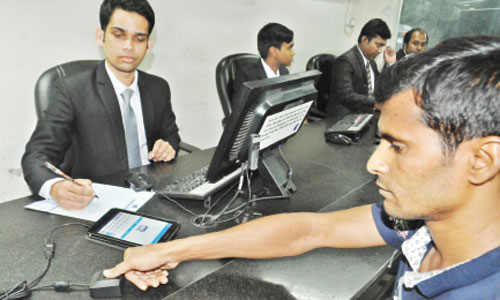The country’s mobile phone operators on Sunday started piloting biometric verification of SIM registration with a glitch caused by mismatch between the subscribers’ fingerprints taken at their customer centres and those stored in the national identity card database of the Election Commission.
Officials of the mobile companies said they were working to find out the reasons for the mismatch but there was no instruction from the telecom regulator what should be done in such cases.
The operators have installed at most of their customer care centres biometric verification devices which are linked with the NID database.
The government is set to launch the biometric verification officially on December 16.
‘We have found a considerable number of cases of the fingerprint mismatch and working to find out the reason. There could be a number of technical reasons for this [mismatch],’ a senior official of a mobile phone company told New Age.
He said that the Bangladesh Telecommunication Regulatory Commission was yet to give any order what would be the status of the subscribers who faced the mismatch.
‘We didn’t suspend the connection of those whose fingerprints are not matching as we don’t have any clear instruction from the BTRC in this regard,’ he said.
Another official of another operator, however, said that the matter was placed before the BTRC and the telecom ministry before the test launch.
‘We were told that if any subscriber is found with a fingerprint mismatch, then he/she will have to redo the fingerprinting process with the EC,’ he said.
Fingerprint, generally thumbprint, generates a unique binary code that is stored in the EC’s national identity card database and when the subscribers verify that, the machines in the operators’ outlet should produce the same binary code.
‘When those two codes mismatch, the thumbprint verification shows negative result,’ an official explained.
Asked about the issue, BTRC chairman Shahjahan Mahmood said he was aware of the situation.
‘The whole idea of piloting a project is to identify such glitches. I am already aware of this thumbprint mismatch issue. We will sit with the operators in two weeks to get feedback. After that, we will make a decision about it, which will benefit the cause and the subscribers,’ he told New Age on Sunday.
Telecom state minister Tarana Halim along with the BTRC chairman on Sunday visited a number of customer care centres of all the operators in the city to see the progress of the biometric verification.
The government recently launched a drive to verify the registration of mobile SIMs in a bid to tackle various telephony crimes.
In the initial result of scrutiny of one crore verified SIMs of the six mobile phone operators recently, the government found that only 23 lakh SIMs were properly registered.
Officials of the mobile companies said they were working to find out the reasons for the mismatch but there was no instruction from the telecom regulator what should be done in such cases.
The operators have installed at most of their customer care centres biometric verification devices which are linked with the NID database.
The government is set to launch the biometric verification officially on December 16.
‘We have found a considerable number of cases of the fingerprint mismatch and working to find out the reason. There could be a number of technical reasons for this [mismatch],’ a senior official of a mobile phone company told New Age.
He said that the Bangladesh Telecommunication Regulatory Commission was yet to give any order what would be the status of the subscribers who faced the mismatch.
‘We didn’t suspend the connection of those whose fingerprints are not matching as we don’t have any clear instruction from the BTRC in this regard,’ he said.
Another official of another operator, however, said that the matter was placed before the BTRC and the telecom ministry before the test launch.
‘We were told that if any subscriber is found with a fingerprint mismatch, then he/she will have to redo the fingerprinting process with the EC,’ he said.
Fingerprint, generally thumbprint, generates a unique binary code that is stored in the EC’s national identity card database and when the subscribers verify that, the machines in the operators’ outlet should produce the same binary code.
‘When those two codes mismatch, the thumbprint verification shows negative result,’ an official explained.
Asked about the issue, BTRC chairman Shahjahan Mahmood said he was aware of the situation.
‘The whole idea of piloting a project is to identify such glitches. I am already aware of this thumbprint mismatch issue. We will sit with the operators in two weeks to get feedback. After that, we will make a decision about it, which will benefit the cause and the subscribers,’ he told New Age on Sunday.
Telecom state minister Tarana Halim along with the BTRC chairman on Sunday visited a number of customer care centres of all the operators in the city to see the progress of the biometric verification.
The government recently launched a drive to verify the registration of mobile SIMs in a bid to tackle various telephony crimes.
In the initial result of scrutiny of one crore verified SIMs of the six mobile phone operators recently, the government found that only 23 lakh SIMs were properly registered.
Source: New Age

